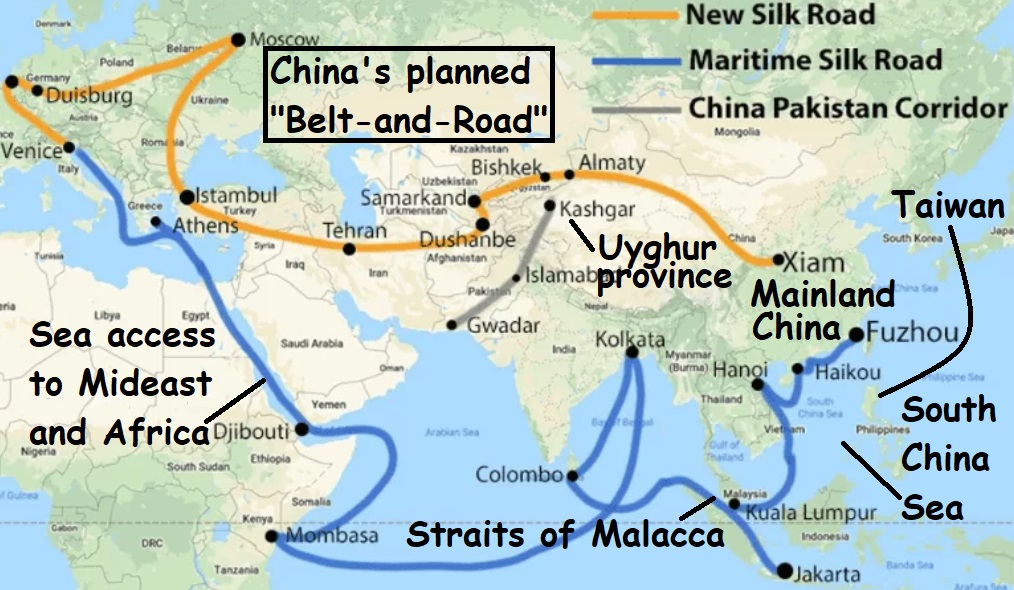|
|
Background on Foreign Policy |
Foreign Policy topics in the 2024 election cycle:
The core issue in 2024 is "Who are our allies?" with very different answers from the two parties about who the US should talk to. On the war in Eastern Europe...
The other two foreign policy hotspots of 2024 are Israel/Hamas (detailed under War & Peace: Gaza, and China/Taiwan (detailed under Free Trade: China but see plenty below from 2020). In summary, Trump applies his mantra of "talk tough and we can solve the problems quickly." Biden/Harris apply more traditional diplomacy; a few excerpts:


America's policy on Taiwan is very much a multi-dimensional policy, mixing trade issues with foreign policy and miltary issues. Accordingly, our readers might refer to our "China news" page for consolidated updates (OnTheIssues had a separate "China issues" page in the early 2000s, where you can read older background on China).
Foreign Policy topics in the 2020 election cycle:
Before the term "American exceptionalism" became popular, candidates discussed "multilateralism" vs. "unilateralism" in how America should deal with the world. Multilateralists believe that America should engage with the world through international organizations such as the United Nations, while unilateralists believe that America should act in America's interest regardless of what the rest of the world thinks.
News on American Exceptionalism (Candidates' recent excerpts)
President John F. Kennedy initiated the embargo against Cuba in 1962 after Fidel Castro led the communist revolution to take over the Cuban government. As of 2015, the embargo is still in effect and is the most enduring trade embargo in modern history. Despite the existence of the embargo, the US is the fifth largest exporter to Cuba. However, Cuba must pay cash for all imports. The UN General Assembly has, since 1992, passed a resolution every year condemning the ongoing impact of the embargo and declaring it to be in violation of international law.
News on Foreign Aid (Candidates' recent excerpts)
Foreign aid advocates (including Hillary Clinton) suggest increasing foreign aid to 1% of the total budget; that increase would be at least an eight-fold increase.
| Billions / year | Economic Assistance | Military Assistance | Total Foreign Aid | |||
|---|---|---|---|---|---|---|
| 2003 | $16.1 | $8.0 | $24.1 | |||
| 2004 | $20.4 | $5.9 | $26.3 | |||
| 2005 | $25.2 | $7.6 | $32.8 | |||
| 2006 | $21.9 | $10.7 | $32.6 | |||
| 2007 | $21.8 | $12.9 | $34.7 | |||
| 2008 | $26.9 | $15.4 | $42.3 | |||
| 2009 | $29.8 | $14.9 | $44.7 | |||
| 2010 | $29.0 | $13.3 | $42.3 | |||
| 2011 | $30.7 | $16.5 | $47.2 | |||
| 2012 | $31.1 | $14.4 | $45.6 |
The distribution of foreign aid is not evenly distributed and indeed is politically-determined. The table below shows the distribution for the top ten recipient countries for 2010 to 2012 (average distribution for the three years, in millions). Those three years represent President Obama's first three budgets without influence of President Bush.
| Millions / year | Economic Assistance | Military Assistance | Total Foreign Aid | Afghanistan | $3,050 | $6,700 | $9,750 | Israel | $30 | $2,950 | $2,980 | Iraq | $1,200 | $1,500 | $2,700 | Pakistan | $1,100 | $500 | $1,600 | Egypt | $200 | $1,300 | $1,500 | Jordan | $500 | $300 | $ 800 | Colombia | $500 | $100 | $ 600 | West Bank/Gaza | $600 | $0 | $ 600 | Russia | $400 | $100 | $ 500 | Mexico | $300 | $100 | $ 400 |
|---|
|